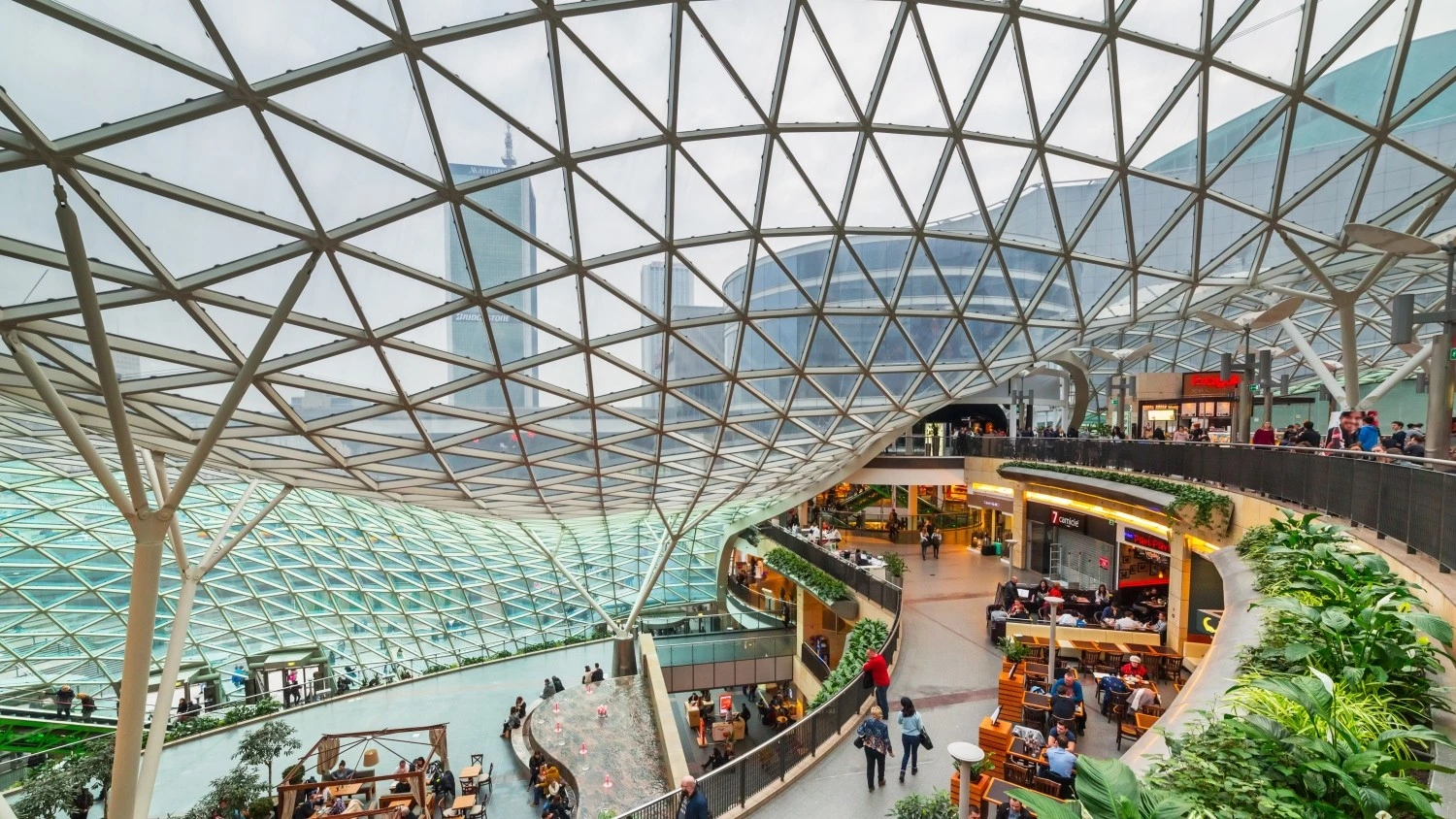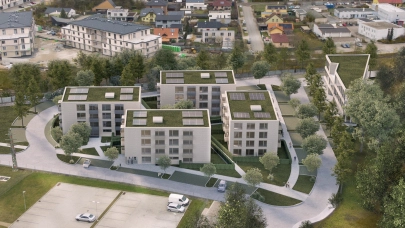New supply – decreasing growth pace
H1 2018 was closed by the modern retail sector with a result of 14.4 million sqm, out of which approx. 73% was represented by 425 schemes classified as traditional shopping centres. The authors of the report highlight the positive result achieved in Q2, i.e. 110 000 sqm of space resulting from delivery to the market of six new schemes and completion of one expansion. Indisputably, the most important event that took place during the period reported on was the opening of the Forum Gdańsk retail and entertainment complex located on the outskirts of Gdańsk’s historic city centre. In the first three weeks following its launch, the scheme had more than 1 million visitors. In turn, the modernization and extension of Warsaw’s CEDET is now complete after 3.5 years of work that cost more than PLN 400 million. The building, considered to be one of the city’s icons, offers approx. 7,000 sqm of retail and office space. Furthermore, the opening of another outlet centre located outside of the main agglomerations, i.e. the Smart Outlet in Bydgoszcz, was also seen as an important event from the market’s point of view.
Despite the fact that the Polish market is dominated by the traditional shopping centre format, the openings of e.g. Vendo Park in Dąbrowa Górnicza and Saller Park in Oława are a proof that developers and investors choose to invest, and will continue to do so, in small retail parks. Schemes of this type are valued by local consumers as well as retail operators looking to decrease their operating expenses.
“The pace of growth in the retail sector has clearly dropped down a gear. After the few past years when we got used to record-breaking increases (the average for the past decade was more than 660 000 sqm of new supply per annum), the market has now reached a new stage in its maturity. Its cooling off in the coming years will lead to e.g. reduced supply and absorption capacity. Importantly, the change dynamics as regards consumer habits and expectations will have a significant impact on the retail market’s evolution process”, added Patrycja Dzikowska, Head Of Research And Consultancy, Central And Eastern Europe at BNP Paribas Real Estate Poland.
Demand – increasing market dynamics and new challenges
15 new retail chains had their debut on the Polish market in H1. They included e.g. the American fashion brand Bebe and German discount chain TEDi. Moreover, the Dealz chain, so far present on markets such as France, Spain and Ireland, also made the decision to expand its operations into Poland, where the brand’s strategy is based on offering a broad range of goods with the majority thereof priced at PLN 5.00. The chain’s plan is to open 20 stores across Poland this year. It should be pointed out that the growth of the discount operator sector will be contingent on the supply of low-cost schemes in smaller towns. In turn, they are gradually conquering the small town markets taking advantage of the growing wealth of the Polish population, migration to the suburbs and the fact that the markets in large urban centres are becoming saturated.
Patrycja Dzikowska stresses that the Polish retail market is highly competitive, which means that the new brands will have to face some extremely challenging conditions. The struggle for a solid market position frequently ends with having to yield ground to others. The debut of one’s dreams is the most difficult to execute for brands from the fashion and accessories sector that focus on looking for locations in leading schemes. And these, not surprisingly, are extremely popular and difficult to win a spot at.
An important market event recorded in Q2 was the opening of OBI stores in the locations previously occupied by Praktiker. The authors of the report expect that this swap will result in a drop of the overall vacancy rate from approx. 4% (as at the end of 2017) down to the average level recorded over the past two years, i.e. 2.00-2.5%.
The ban on Sunday trading, the growth of e-commerce, new generation consumers with entirely new habits and expectations and the increasing competition will be a test for the operators as regards their market position and ability to adjust to the extremely fast pace of changes occurring on the market.
“The combination of positive economic indicators means that the conditions for retail trade are favourable. Increasing employment and wages translate into continuously improving retail sales results, which in June increased by 10.3% y-o-y. The turnover analysis in respect of shopping centres as carried out by the Polish Council of Shopping Centres for the past few years now confirms that the modern retail sector is in good form. Naturally, we should remember that we are dealing with an average result here, one that takes into account both the sector’s leaders and those market players that are not performing as well”, highlighted Natasa Mika, Retail Department at BNP Paribas Real Estate Poland.
She furthermore stresses that entry onto the consumer market of new generations with their different expectations as to the quality of the space and offer of a shopping centre will put to a test the ability of many schemes and retail brands to identify and quickly react to market changes. The additional challenge for traditional retail is the continuously growing e-commerce sector, which – as proven by the more developed markets across Western Europe, can absorb as much as 15% of the total volume of retail sales.
Rents – stable for renowned schemes, still waiting for the aftereffects of the ban on Sunday trading
Invariably, the highest rents are recorded for prime locations. Monthly rent in the leading shopping centres in the capital represents a cost within the range of €110.00 – 130.00 / sqm for prime schemes, i.e. fashion stores located in areas best exposed to consumers. Rents in regional cities in H1 oscillated between €45.00 – 60.00 / sqm / month. Authors of the report stress that landlords of schemes that are now losing their market position and operating within a highly competitive environment have to give in to their tenants’ expectations as to rent decreases and higher participation in fit-out costs. Furthermore, as regards rents, experts at BNP Paribas Real Estate Poland point out that the act on the ban on Sunday trading could have a negative impact on the situation of stores operating in shopping centres, which in turn will lead to pressure being exerted by tenants to renegotiate their lease terms.
Schemes under construction – main agglomerations and small markets / expansions
There are currently approx. 505 000 sqm of modern retail space spread across different construction sites throughout Poland. The first two positions on the list of the largest projects are taken up by schemes being developed by Echo Investment and EPP. They are the soon to be opened Libero in Katowice, with more than 95% of its space already leased, and Galeria Młociny under development near the transport hub in Warsaw’s Bielany district. There is also construction work on smaller markets, with Galeria Hosso being developed in Świebodzin and Gubin.
Furthermore, attention is drawn in the report to the fact that in the short-term perspective it is expected that the trend to modernize and expand existing schemes will continue to grow. Experts at BNP Paribas Real Estate Poland stress that the expansions could generate as much as 20% of new supply. Different stages of expansion work are currently underway at large renowned retail complexes such as Centrum Janki and Warsaw’s Atrium Targówek, Atrium Reduta and Atrium Promenada, as well as small retail parks and shopping centres where new free-standing buildings are now being added, e.g. Dekada in Grójec and the retail park adjoining the Galena Centre in Jaworzno.




